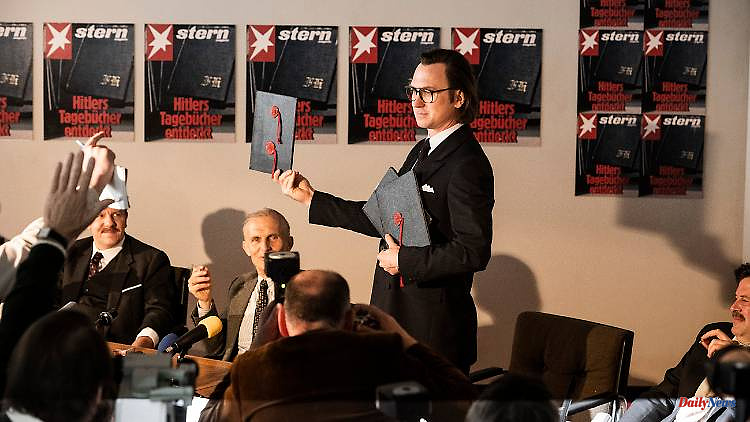Almost 40 years ago, the "Stern" thinks it landed the big coup with the Hitler diaries. In the end, however, it will be the biggest media scandal to date. This is what the series "Faking Hitler" tells, which is running on VOX on free TV from today.
At the beginning of the 1980s, the ball started rolling, which brought the magazine "Stern" its worst defeat two years later and is still considered the biggest media scandal today. At that time, the renowned investigative journalist Gerd Heidemann fell for Konrad Kujau, a skilful and shrewd art forger. This story unfolds in the mini-series "Faking Hitler", which is based on the "Stern" podcast of the same name. Lars Eidinger shines as Gerd Heidemann. The right cast was found for the role of Konrad Kujau in Moritz Bleibtreu.
It is not the first time that the story has been converted into moving images. The British series "Selling Hitler" by Alastair Reid from 1991 with Jonathan Pryce and the film "Schtonk!" by director Helmut Dietl with Götz George the following year took on them in a satirical way. However, the approach of "Faking Hitler" is different. Not only because the authors around initiator Tommy Wosch and the directors Wolfgang Groos and Tobi Baumann were able to take significantly more time than Dietl once did thanks to a total length of four and a half hours in six episodes. It's also less about the gleeful humor that's inherent in the whole thing. Rather, the focus is on the tragic heroes of the story and what drives them. This is garnished with fictional elements that further underline the explosiveness of the events.
At the time, Gerd Heidemann (Lars Eidinger) was the driving force behind the "Stern" editorial team. Or he was, because his last blockbuster was a while ago. And so he is under pressure to finally have to conjure up an exclusive story out of a hat that will cause a stir and circulation. As a lover of Nazi memorabilia, through one of his contacts he came across diaries that the Führer himself is said to have written between 1935 and 1945 - secretly, of course. Diaries that show the monstrous Adolf Hitler in a different, more human light. At the "Stern" one soon believed that the history of the Third Reich had to be rewritten. Nobody suspects that the actual author of the 62 books is the one who pretends to be an intermediary. For him, Konrad Kujau, it is the biggest coup of his career as an art forger. For the journalist Gerd Heidemann, however, it is the biggest defeat and the end of his career.
It took two years from the first contact to the presentation of the Hitler diaries at an international press conference on April 25, 1983. Two years in which there were many moments in which Heidemann could become suspicious - or even become suspicious. But it is due to his narcissism, his ambition and the pressure from his superiors that he repeatedly pushes aside burgeoning doubts. And it's the witty, often outrageous excuses that Kujau throws at him when he doesn't keep up with the promised books. In the end, he received around nine million Deutschmarks, which Heidemann lured out of the publisher's ribs.
In the context of these real events, "Faking Hitler" tells the fictional story of the young journalist Elisabeth Stöckel (Sinje Irslinger), who works up the SS past of "Derrick" actor Horst Tappert for "Stern". She finds out that her own father, a left-liberal university professor (Ulrich Tukur), has a similarly inglorious background. This B strand, which is closely intertwined with the diaries, is also about coming to terms with the past and abuse of power.
Anyone who knows the "Faking Hitler" podcast knows about the special relationship that developed between Heidemann and Kujau, because there are numerous recordings of the telephone conversations between the two men. Heidemann recorded them for emergencies. When he finally went to court for fraud, however, they did not help him any further. He was nevertheless sentenced to prison. But they show the listener how Kujau became more and more a kind of friend for Heidemann, while Heidemann kept leading him on the slippery slope with crude stories. This special relationship can now also be felt in the series in scenes between Lars Eidinger and Moritz Bleibtreu.
Bleibtreu, who was born in Munich and moved to Hamburg, acts as a Kujai with a Swabian accent in an extremely devious way. And Eidinger, who is used to playing someone possessed. This time, however, one who is not - like his triple "Tatort" character Kai Korthals - obsessed with killing, but with fame and success. He plays it with a tragic undertone, without exposing his character to ridicule. What recedes more and more into the background over the course of the series and makes identification with both characters possible in the first place is their own fascination with National Socialism. It was their supposedly right-wing position that brought them together in the first place. At this point, every hair on the back of the viewer's neck would actually stand up and yet you catch yourself having sympathies for both characters again and again.
And of course you ask yourself more than once: How did it come to this? How could Heidemann miss the signs? But the case of Claas Relotius in 2018, as well as all the fake news of current events, shows that people are only too happy to believe what they want to believe. And so "Faking Hitler" is optically retroesk and thanks to the great equipment and the suitable selection of music makes fans of this era a lot of fun, but the story is unfortunately still quite up-to-date.
Three episodes each of "Faking Hitler" will be shown on September 14 and 21 at 8:15 p.m. on VOX free TV. The series is also available at any time on RTL.












